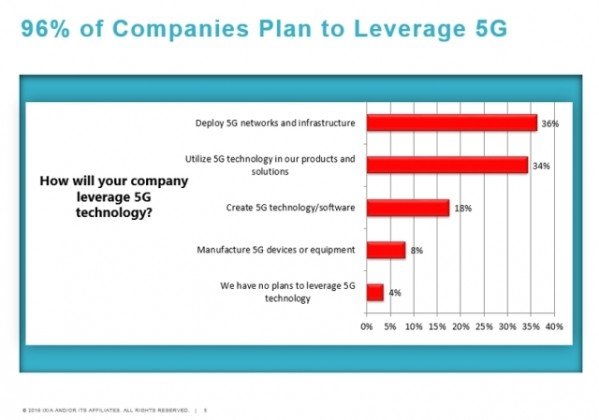
Both Intel and Qualcomm are aiming to enhance their development activities in the 5G mobile field to increase market presence.
A recent 5G consumer survey conducted by Qualcomm revealed that 48 percent of the respondents are likely to purchase a smartphone that supports 5G when available. Furthermore, 5G was the top feature that consumers were willing to pay more for in their next mobile device.
The survey indicates that 5G will work for both: by driving IoT business revenue from enterprise for telecom operators and 5G services can be a vital solution for mobile phone users to improve their experience on the high-end broadband network.
Most importantly, 5G services, which are expected in 2020, will be a boon for the telecom operators as traditional telecommunications revenue stagnates.

A recent survey on 5G by Ixia reveals that 96 percent of large technology companies plan to leverage 5G and that 83 percent will have 5G solutions deployed within the next 24 months.
Nearly every company surveyed plans to adopt 5G, with two out of three respondents evaluating 5G over the next year. 34 percent of the organizations plan to release 5G technologies over the next 12 months if they have not done so yet.
Kalyan Sundhar, vice president, Mobility and Virtualization Products at Ixia, said: “5G testing tools can help organizations make 5G a success even before all of the standards are finalized. Developers can ensure their networks and applications are ready to take advantage of the speed and increased device connectivity promised by 5G.”
5G in Korea
According to GlobalData, 5G subscriptions in South Korea will outnumber 3G by 2020, following world’s first commercial 5G deployment during the Pyeongchang 2018 Winter Olympics, in Korea’s rural Gangwon province.
With growth of 5G, traditional communications services like fixed telephony and mobile voice will see a decline in revenue over the coming years. Voice service revenue will decline at an annual rate of 8.4 percent per year between 2016 and 2021, while mobile voice revenue will drop an average of 7.0 percent per year over the same period.
GlobalData telecoms market analyst Malcolm Rogers said: “Operators around the globe faced with the same challenge, evolve to something more than a pipe provider or offer services that come with more utility.”
Operators in some telecom markets have been slow to react to the digital disruption caused by OTTs and internet giants like Google and Amazon. However, operators in South Korea have been investing in new digital business for years.

KT, LG U+ and SK Telecom (SKT) are now focusing on a range of non-core segments such as industrial IoT, payment platforms, media and commerce to boost their business. KT launched a new Artificial Intelligence (AI) based home assistant service that also functions as an IPTV set top box.
Korea Telecom has already completed trial to offer 5G enabled entertainment services such as high definition virtual reality and 8K mobile video while SKT and KT are developing driverless car solutions and security platforms based on 5G technologies.
Recently, Huawei and Smart Axiata, Cambodia’s mobile operator, announced the rollout of 4.5G mobile connectivity in the country. This evolution of mobile technology will enable subscribers to enjoy 10 times faster average mobile Internet speeds than normal 4G.
Qualcomm
Qualcomm Technologies said its 5G NR mmWave prototype system, which operates in millimeter wave (mmWave) spectrum bands above 24 GHz, demonstrates how telecoms can utilize the 5G NR mmWave technologies to offer better mobile broadband.
Qualcomm said the prototype system also showcases the company’s optimized mmWave RF Front-end design in a smartphone form-factor to test and trial real-world mmWave challenges, such as device and hand-blocking.
With support for 800 MHz bandwidth and advanced 5G NR technologies including LDPC channel coding for data channels, the prototype system is designed to support peak download speeds of up to 5 gigabits per second.
Intel
Intel said 5G Mobile Trial Platform will begin to support the new non-standalone NR standard when available in the fourth quarter of this year for live tests and trials.
“It’s an industry first. We’ll join with operators to take non-standalone NR out of the lab and begin testing it in real-world situations. We’ll be able to help the industry meet ambitious targets to deploy commercial 5G services before 2020,” said Asha Keddy, vice president, Client and Internet of Things Businesses at Intel.
Qualcomm Technologies’ 5G NR mmWave prototype system will be utilized in 3GPP-based 5G NR interoperability testing and over-the-air trials with infrastructure vendors and network operators starting in the second half of 2017.
Qualcomm Technologies will utilize learning from this testing and trials to help drive the ongoing development of the Qualcomm Snapdragon X50 5G multimode modem to support commercial mobile network launches in 2019 based on the 3GPP 5G NR standard.
“5G NR mmWave prototype system is proving that sustained mobile broadband communications and smartphone form-factor devices are progressing for 2019 launches,” said Cristiano Amon, executive vice president, Qualcomm Technologies.
Meanwhile, Qualcomm Technologies and Nokia plan to conduct interoperability testing and over-the-air field trials based on the 5G New Radio (NR) Release-15 specifications being developed by 3GPP.
The testing and trials will utilize the Nokia 5G FIRST solution, incorporating the Nokia AirScale base station transmitting over the 5G NR radio interface to the device prototype from Qualcomm Technologies.
The testing will include 5G NR operation in sub-6 GHz spectrum bands such as 3.5 GHz and 4.5 GHz, as well as millimeter wave (mmWave) spectrum bands such as 28 GHz and 39 GHz, to trial the 5G NR unified design across diverse spectrum bands.
The interoperability testing, which will start in the second half of 2017, will track with the first 3GPP 5G NR specification that will be part of Release 15. The companies are collaborating with network operators to conduct 5G NR over-the-air field trials starting in 2018 across various regions including China, Europe, Japan, and the USA.
